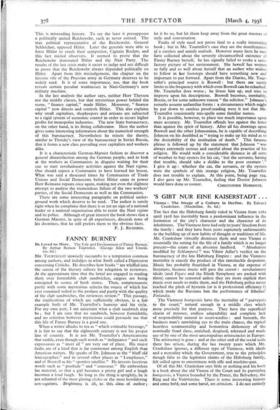FANNY BURNEY
Be Loved no More. The Life and Em;ironment of Fanny Burney, By Arthur Bernon Tourtellot. (George Allen and Unwin. los. 6d.) - • •
MR. TOURTELLOT unwisely succumbs to a temptation common among authors, and indulges in what Swift called a Digression concerning Criticks. He describes how books " are whiffed into the sancta of the literary editors for relegation .to reviewers. At the approximate time that the latter' are engiged in reading them over formidable club sandwiches; cargoes are being consigned to scores of book stores. 'Then, commensurate. partly with some mysterious criteilia. the source of which has` ever remained veiled to the profane and partly With the quality of the club sandwiches, the reviewers 'review." Thii passage, the implications of which are sufficiently. obvious, is a fair example both of Mr. Tourtellot's humour and his style. For my own part, I am uncertain what a club sandwich may be ; but I am sure that no sandwich, however ,formidable, and no criterion however mysterious could persuade me that
this life of Fanny Burney is a goOd one. • -
When a writer alludes to tea as " which estimable beverage," it is fair to say that the eighteenth century is not his proper line of country. It is not Mr. Tourtellot's Americanisms that rankle, even though such words as " indignance " and such expressions as " most all " are very out of place. His major faults are of a kind that is far commoner among English than American writers. He speaks of Dr. Johnson as the " bluff old lexicographer," and in several other places as " Lexiphanes," and of Boswell as his " sportive satellite." He invents facetious words such as " postlude " and " consoeur." He embroiders his material, so that a girl becoines a pretty girl and a laugh becomes a loud laugh. So long as the thing is sprightly, he is not ashamed of the most glaring clichés or the most bewildering non-sequiturs. . Brightness is all,- tc)-- this—class, of. author; let it be so, but let them keep away from the great masters of style and :conversation. Faults of style need not prove fatal to a really interesting book ; but in Mr. Tourtellot's case they are the manifestation of a careless and untidy outlook. However many facts he may Have collected about the severely circumscribed existence of Fanny Burney herself, he has signally failed to evoke a satis- factory picture of her environment. She herself has written so fully and so well about herself that an author who wishes to follow in her footsteps should have something new and important to put forward. Apart from the Diaries, Mr. Tour- teltot's principal source is Boswell : but there are surely limits to the frequency with which even Boswell can berehashed. Mr. Tourtellot does worse ; he livens him up, and tries to improve upon his descriptions. Boswell becomes, inevitably, Bozzie, or for some unknown reason " the solicitor." Johnson's remarks assume unfamiliar forms : a circumstance which -might be put down to careless proof-reading were it not that Mr. Tourtellot consistently mis-spells some familiar names.
It is possible, however, to place too much importance upon mere accuracy. Mr. Tourtellot offends less against the letter thin against the spirit of history.- After all his drawings upon Boswell and the other Johnsoniana, he is capable of describing Johnson on his deathbed as " trying to make up his mind as to the desirability of the institution of death." This fatuous phrase is followed up by the statement that Johnson " was always extremely serious and careful about the practice of his religiOn. He would walk a considerable distance in all sorts of weather to buy oysters for his cat, ' lest the servants, having that trouble, should take a dislike to the poor creature '." I give it up : whether the cat, the servants, or the oysters were the symbols of this strange religion, Mr. Tourtellot does not trouble to explain. At this point, being page 194, I also gave up Mr. Tourtellot, feeling that Doctor Johnson






































































 Previous page
Previous page